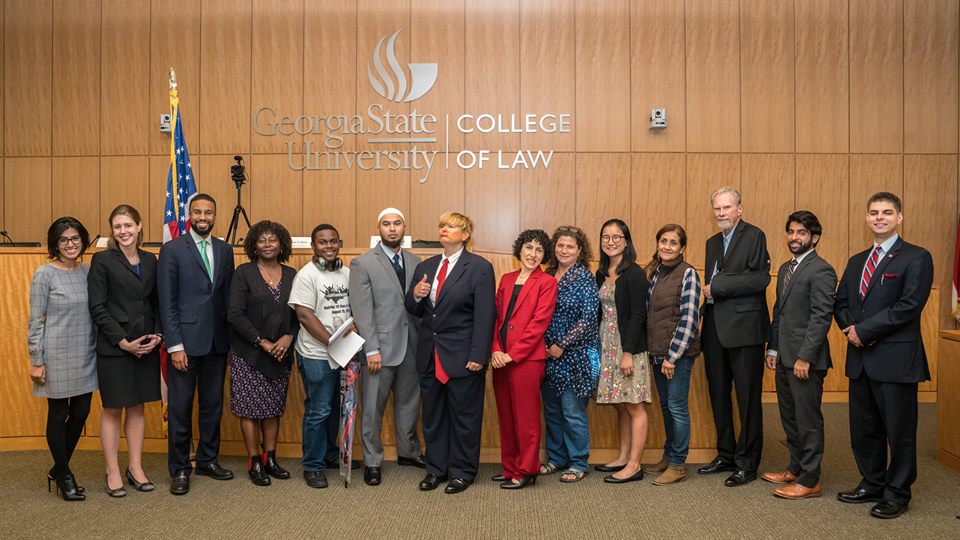 (ATLANTA, GA, 10/9/17) — On Monday, Oct. 9th, at Georgia State University College of Law, civil rights groups held The People vs. The Muslim Ban in response to President Trump’s orders targeting Muslim-majority nations.
(ATLANTA, GA, 10/9/17) — On Monday, Oct. 9th, at Georgia State University College of Law, civil rights groups held The People vs. The Muslim Ban in response to President Trump’s orders targeting Muslim-majority nations.During the public tribunal, real attorneys and law students will debate the legal merits of President Trump’s Muslim bans, while real witnesses—including Georgia Muslims, immigrants, and refugees—testified about how the bans impact their communities.
A jury of activists, lawyers, and faith leaders considered the evidence before announcing its verdict: all of the Muslim Bans should be overturned as unconstitutional and illegtimate acts of anti-Muslim discrimination.
Event hosts include the Georgia chapter of the Council on American-Islamic Relations (CAIR Georgia), Project South, the GSU Muslim Law Students Association, the GSU National Lawyers Guild, Asian Americans Advancing Justice – Atlanta, Immigration Law Society, and Women Watch Africa.
“We hope that this engaging and educational people’s tribunal will raise public awareness about the legal and human impact President Trump’s Muslim bans are having on Georgia Muslims, immigrants, and refugees,” said Azadeh Shahshahani, Legal & Advocacy Director with Project South.
Trump’s latest immigration order places restrictions on travel to the United States from eight countries, including six Muslim-majority countries, and comes as the previous ban on visitors from six Muslim-majority countries expired on September 24, 2017.
The Trump Administration kept restrictions on five of the six Muslim-majority nations – Iran, Libya, Somalia, Syria, and Yemen – and added new restrictions on visitors from Chad, North Korea and Venezuela.
“We hope that this engaging and educational people’s tribunal will raise public awareness about the legal and human impact President Trump’s Muslim bans are having on Georgia Muslims, immigrants, and refugees,” said Azadeh Shahshahani, Legal & Advocacy Director with Project South.
Trump’s latest immigration order places restrictions on travel to the United States from eight countries, including six Muslim-majority countries, and comes as the previous ban on visitors from six Muslim-majority countries expired on September 24, 2017.
The Trump Administration kept restrictions on five of the six Muslim-majority nations – Iran, Libya, Somalia, Syria, and Yemen – and added new restrictions on visitors from Chad, North Korea and Venezuela.
“We expect this people’s tribunal to show that the Muslim ban was irrational and unconstitutional the first two times President Trump tried to implement it, and remains so today,” said Edward Ahmed Mitchell, executive director of CAIR Georgia. “We can protect our national security without engaging in thinly veiled bigotry.”
“The goal of this tribunal is to continue to educate the public on the full impact of the Muslim Ban,” said Stephanie Cho, Executive Director of Asian Americans Advancing Justice – Atlanta. “Too many in our communities have suffered since the first iteration of the Ban and the latest version continues to impact more of the AAPI community by including North Korea. Advancing Justice – Atlanta will continue to fight this unconstitutional Ban that feeds into the current culture of Islamophobia and anti-immigrant hysteria within the U.S. and abroad.”
SEE: Trump Administration Announces New Travel Ban
The Supreme Court has dismissed one of the cases against President Trump’s expired Muslim ban as moot, and seems unlikely to issue a ruling on the constitutionality of the remaining case.
The Supreme Court has dismissed one of the cases against President Trump’s expired Muslim ban as moot, and seems unlikely to issue a ruling on the constitutionality of the remaining case.
Attorneys for Americans impacted by the ban have called on the Supreme Court to issue a ruling against the ban, while the Trump Administration has asked the Supreme Court to dismiss the case without issuing a ruling on its merits.

